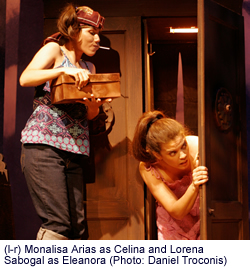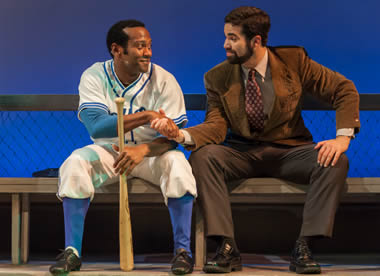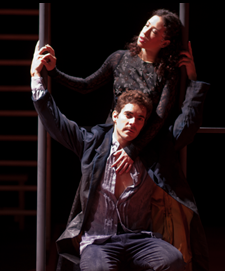|
JACQUELINE LAWTON: Why did you decide to get into theatre? Was there someone or a particular show that inspired you?
ROSALIND LACY: I grew up in L.A. with children of movie stars as pals. My mother, the opera singer, and cousins were musicians and artists. My Mexican cousin, who is like a brother, took me to see Julie Harris as Joan of Arc in The Lark, after which I spent a sleepless night I was so hooked on inspiration. This cousin, who is now a well-known California landscape/abstract artist, told me something unforgettable: "When they look at my paintings, they don't see my skin color." In high school, I was a nerd and a flag twirler who played Mrs. Cliveden Banks in Sutton Vane's Outward Bound. I earned a scholarship to a Pasadena Playhouse summer session, where I once played second violin in the orchestra for the Victor Herbert operetta, The Fortune Teller. At Occidental College, I played Shen-Te/Shui-Ta in Brecht's The Good Woman of Setzuan. At U.C.L.A., I got cast in theater productions although I was an English major, who wanted to write poetry and novels or go to law school. At 20th Century-Fox, I failed a screen test for not being sexy and photogenic. I studied acting in New York with "method" teachers and acted professionally in stock. After marriage, I taught high school English/Drama in Cleveland, and had a ball directing kids in Guys and Dolls. In addition to acting in community theatre, I wrote as a local news reporter/journalist in New Jersey. In Pittsburgh, I wrote about theatre and classical music for the Butler Eagle and Pittsburgh Post-Gazette. JL: How long have you lived and worked as a theatre critic in D.C.? What brought you here? Why have you stayed? RL: I've lived and worked as a theatre critic in D.C. off and on since 1998; that's almost 15 years. I figured, what the hell, reviewing consolidates my life. I've stayed because my husband, a physicist and great love of my life, works here. And we both love the smorgasbord of theatre in D.C. I like all the political agita. As a community activist, I went back and studied law at Montgomery College (Md), and completed a paralegal degree. I considered law school but I love my husband, also a Californian. We enjoy the theatre and the excitement of living in the area. JL: How do you define the work you do? Specifically, what is the role of the theatre critic in the world of theatre? What contribution do you hope to make in the D.C. Theatre community and the American Theatre? RL: I cover Hispanic (Spanish language) theatre in D.C. and try to translate the significance of its rich Spanish cultural theatre heritage, which is not fully appreciated, for the Anglo audience. I and my cousins lost our fluency as assimilated kids; but I am now learning to speak in Spanish. I have not lived in vain if I can convince one Anglo-speaker or another English-speaking critic that Spanish theatre is an elevating, inspirational experience, too good to dismiss. Spanish theatre is closest to the Greco-Roman source that started on cathedral steps and in the streets of Spain. Spanish actors do not overact. It's the expressive style, that is effusive, wonderfully imagistic and poetic, exaggerated and often satirical. My contribution? I hope without sounding too didactic, I can encourage audiences to appreciate the history of theatre, to understand it, and that includes the Golden Age of Spanish Theatre, that is often clouded over, overshadowed by English Elizabethan history and Shakespeare. JL: If your work as a theatre critic doesn’t pay the bills, what else do you do? How do you balance this work with your play viewing and criticism? RL: I have a masters' degree in English Literature and a Paralegal certificate for three years of legal studies at Montgomery College. I juggle my time between teaching, reviewing, and seeing plays with my husband. I've worked as a substitute teacher in the Montgomery County Schools, and as a tutor at the Huntington Schools. I do volunteer paralegal work for the National League of American Pen Women (NLAPW), headquartered at 1300 17th Street NW, (Dupont Circle) in D.C. My ultimate goal is to finish the three novels I'm working on with support from the Writer's Center, in Bethesda, MD. I have written free-lance political articles for the Future of Freedom Foundation, a libertarian think tank in Fairfax, Virginia (www.fff.org). I will never retire. JL: What skills and traits do you feel a successful theatre critic should have when writing about theatre, especially when it comes to new plays? RL: Humility. The willingness to be wrong and get slammed for it. The drive to get better; not older. Excellent writing skills, knowledge of grammar, a growing vocabulary. I read Spanish and continue to take conversation classes for fluency. I have traveled in Mexico, Spain, and lived in El Salvador with a family on a coffee finca (cooperative coffee farm). Open-mindedness. Your opinion is only one among many; and you could be wrong. You need a tough skin, to risk being disliked, insulted by people with more power than you have, when you know that you are right. In a way, we're bull fighters and at any moment, we can be gored. You must have credibility, however, so that when the audience reads your reviews, they will say, "Hey, I understand. I saw that too." They may not agree with you; but they have got to believe you. So you have to say why you hate or love something that happens on stage. Back it up. I think my background in acting and directing kids helps me enormously. Sometimes I feel it is as if I am up there on stage with the characters. Yet I've got to be able to pull back and be objective and be aware of how I am reacting emotionally in my gut. I feel there are times when we as reviewers have a responsibility to hold artistic directors, and actors accountable to high production standards. JL: What is your writing and viewing process? Do you read the script prior to seeing a production? Do you research the author and/or world of the play? Do you read the program notes? RL: I absolutely read the play first before seeing it to determine themes, the question addressed. For the Hispanic theatres, I read in Spanish and English. Believe me, there's a difference. Translation can filter out some of the good stuff. Yes, I read the program notes. To understand production values and what the director is trying to do, you must do that. If it is a period piece in modern dress, it is essential to know why and what the director is trying to accomplish. With Hispanic plays, I do a voluminous amount of background research. I am a great believer in making audiences aware of historical context. We as Americans forget history and I feel it is essential to be aware to fully understand what the playwright is saying through the characters. You have to know history in depth. Especially in Hispanic/Spanish/Latin American plays, that portray a violent history, of torture, disappearances, and revolution. Argentine playwrights, such as the admirable Griselda Gambaro, for example, is part of the theatre of the grotesque movement. Her play, The Walls (Las Paredes) http://dctheatrescene.com/2007/02/06/las-paredes-the-walls/ is one of the most memorable I've seen. Also Lucido (Lucid) by Rafael Spregelburd. But you have to understand the historical context or you won't understand the play. JL: In the article, “Ohio Critic's Tough Words Elicit Rough Reaction,” Denver Post Theater Critic John Moore states: “There is no universal rule book for criticism, no how-to manual. My guidelines: Be true to your visceral emotional response, good or bad. State your case and back it up. Be a catalyst for discussion. Encourage dialogue. Don't be personal. Never try to be funny at the expense of someone's feelings.” What guidelines, rules or standards do you have for your own work? Have you always upheld them? If so, at what cost? If not, what shifted the line for you? RL: When I was being trained for reporting local news at the Suburban Newspapers of Northern New Jersey, a retired New York Times reporter told me: Write what you see; not what you want to see or think you see. That's profound if you think about it. When I was covering planning board meetings in New Jersey, I was threatened twice in a parking lot by a politician and another time by a mafia member. My editor protected me by writing an editorial about my First Amendment rights as a reporter. After that, I objectively reported what was going on, but I was extremely careful. I gave the people I wrote about respect and legitimacy. But all the time, I realized the risks, and I watched my rearview mirror. It was easy for me to transition into writing about actors. Never say that the opera singer is fat. The same holds true for politicians or members of the mafia. Guidelines? I try not to give away the ending. I have pet peeves. I am tired of hearing unnecessary profanity onstage for shock effect. Every other word an expletive deleted-- I hate that. Or unmotivated sexuality to turn up the heat. Who needs that? I want to be intellectually challenged. I want to discover new worlds, something unique. And I expect actors to project well so we can hear. Also, directors to be aware of site lines so actors do not block each other. That's a problem I've experienced at Arena Stage. What is most satisfying? Do you feel satisfied? Challenged to think? Or do you wish you had stayed home? Acting quality. Is the acting believable? How involved are the actors in their roles? Or do they act as if they can hardly wait to smoke a cigarette in the wings? Are they organically and emotionally involved? My general rule is to find something positive to say about the play. I've worked both on stage and behind the sets and know the sweat equity, the emotionally draining physical commitment. If that effort is sincere, then the least I can do is see and hear something good to say about it. Then the next question: Is it good enough to ask other people to plunk down the cost of the ticket to sit through it? Is it worth the money? JL: What is the greatest part of being a theatre critic? What has been your most difficult challenge? RL: Aside from free passes, it's fun. Something new every assignment. And an enormous challenge. If I can share and help an audience member better understand, then what I'm doing is worthwhile. If one person tells me: You helped me through a difficult and obscure play. You make it clear. Then my research and effort to find the right words are worth it. It's hard work but I enjoy the danger, the risk. It's editorial opinion. And I love writing it. I never get bored. Let's face it. It's power. In ancient Greece, the theatre was the one place where playwrights, like Sophocles, Aeschylus and Euripides could attack injustice, ridicule, and challenge authority; and get away with it. It was the place for freedom of thought without retaliation from the ruler/king. It's just actors on stage; it's not really happening. In the same tradition, Garcia Lorca used puppetry in Spain. I love seeing satire. It makes me feel better about the world around me. The most difficult challenge for me is to write a pan or negative review. When I saw Eugene O'Neill's Beyond the Horizon, a play I love, at TACT, for example, I thought the directing was wrong-headed. It was tough to attack because I had talked one-on-one with the director at a Footlightsdc dinner discussion. Nonetheless, I wrote that the production was: "A labor of love that was labored." Her attempts at expressionism, to be surreal, with a dopey-looking puppet, failed. So I said so in the review. Another difficult challenge has been to not write for pull quotes to please dramaturgs and marketing directors. To get your by-line or publisher posted in an ad, poster or theatre web site, can be an ego-trip. But I'm writing for readers, audience members, whom I respect, with budgets and pocketbooks. Why should the audience see this play? So I interpret what the play is about, the themes, inside knowledge that will deepen understanding and enjoyment, without giving away the ending. JL: Who are your favorite playwrights? What is it about their work that inspires or draws you to them? RL: Garcia Lorca-for his exquisitely, richly poetic, imagistic, imaginative use of the language. And for his richly symbolic folk dramas. He was a genius who was way ahead of his time. Then another favorite is Samuel Beckett. I like his creative arrogance, that established Theatre of the Absurd. I reviewed Happy Days at Kennedy Center and negatively criticized the production team for using a cutesy, recognizable television theme music from a popular program for the intermission interlude. Disastrously wrong. Beckett's will has copyright restrictions, that a director or actor cannot change one word in his text. It's copyright law. Production values should be respectful to the playwright as well. I love Shakespeare and his Spanish counterpart, Lope De Vega for his vivid language that opens the window to 16th and 17th century Spain, the swashbuckling Golden Age. I never really organically understood what the medieval code of honor meant until I saw The Knight from Olmedo/El Caballero de Olmedo. And thanks to Michael Kahn's and Hugo Medrano's collaboration between the Shakespeare Theatre in D.C. and the GALA Hispanic Theatre, I didn't have to fly to Spain. We got to see the imported Fuente Ovejuna/The Sheep Well, a play I never thought I would see produced by a Spanish company here in my lifetime. Other favorites Bertolt Brecht for his theatre of alienation. August Wilson for rich history that has helped me understand my son-in-law. Eugene O'Neill for his experimentation and multi-leveled characters. Aristides Vargas for The Aging of the Plum/La Edad de la Ciruela, a richly poetic saga of a family. JL: DC artistic directors. RL: Top of the line kudos for Hugo and Rebecca Medrano for doing so much on tight budgets that DC. Council on the Arts keep cutting. Jack Marshall, who roars like a lion when TACT gets a bad review. Yet he takes such incredible risks by doing the neglected but often worthy plays from American theatre history. And he backs up his opinions with volumes of well-researched background, that he shares with reviewers and the audience. JL: DC actors, designers and directors are .. RL: Fantastic, altruistic artists. Elizabeth Jenkins McFadden. set designer, is only one paragon. I cannot name them all here. JL: DC playwrights are … RL: ... given great opportunities to air their creative experiments at the Page to Stage at Kennedy Center and the Capital Fringe Festivals in the summertime. I love these outbursts of creativity and experimentation. JL: DC audiences are.... RL: ...sophisticated, savvy, warm, wonderful and vastly different. They also give strong support to children's theatres, such as Imagination Stage, Adventure Theatre and GALita. The next generation is benefitting thanks to DC's intelligent, forward-looking audiences. JL: How do you feel the DC theatre community has addressed the issues of race and gender parity? How has this particular issue impacted you and your work? RL: The GALA Hispanic Theatre has changed my life through Paso Nuevo. I wrote about them and received an invitation to the White House last November, 2012, when Paso Nuevo's After-School Program was recognized with a prestigious award. I wrote a short article about it for DCTheatrescene.com. Paso Nuevo gives kids in Hispanic barrios chances to work through problems with parents, drugs, with racial prejudice against immigrant Latinos. The kids confront and work through their problems by creating characters in their own plays. They write and perform these plays that are often terrific and powerful. This is under the adult leadership of Salvadoran poet/community activist Quique Aviles, at the Tivoli Theatre in Columbia Heights. African Continuum Theatre has opened me to another world, I've come to think of as a treasure for my bi-racial grandchildren. Arena has produced August Wilson and his plays that I once saw and reviewed in Pittsburgh. Jack Marshall at TACT who produced an adaptation of the Richard Wright's novel Native Son. Plays like Platero Y Yo, by Nobel Prize winner, Juan Carlos Gimenez. about friendship, about instinct, survival and respect for nature, plants the seeds for lifelong appreciation. . It starts with children's theatre. JL: What advice do you have for an up and coming DC based theatre critic who has just moved to the area? RL: Get a law or teaching degree. Have a back up profession or source of income. See as many plays as you can. Washington D.C. is overabundant with creative theater ventures. Read plays until your eyes fall out. It's a great city for theater.
0 Comments
Your comment will be posted after it is approved.
Leave a Reply. |
My BlogI'm a playwright, dramaturg, and teaching artist. It is here where you'll find my queries and musings on life, theater and the world. My posts advocate for diversity, inclusion, and equity in the American Theatre and updates on my own work. Please enjoy!
Categories
All
Archives
June 2020
Reading List
|



